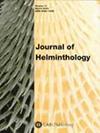Effects of Bothriocephalus acheilognathi on the polarization response of pronephric leucocytes of carp, Cyprinus carpio
IF 1.3
3区 生物学
Q4 PARASITOLOGY
引用次数: 0
Abstract
An躄鱼对鲤鱼前肾白细胞极化反应的影响
采用体外试验研究了山口县 1934 年发现的 Bothriocephalus acheilognathi(绦虫纲:伪叶目)对鲤鱼前肾白细胞极化反应的影响。在鲤鱼血清存在或不存在的情况下,从自然感染的天真鲤鱼和腹腔注射绦虫提取物的鲤鱼体内分离出的白细胞与寄生虫提取物(蛋白浓度为 0-10.0 μg ml-1)接触长达 24 小时。一般来说,随着孵育时间的延长,前肾白细胞(主要是中性粒细胞和嗜酸性粒细胞)的极化反应增加,但不同浓度的蛋白质诱导的反应没有显著差异。不过,在天真鱼、自然感染鱼和注射鱼身上观察到的极化反应存在差异,而且在有鲤鱼血清和没有鲤鱼血清的情况下,细胞的反应也不同。在没有鲤鱼血清的情况下,注射鱼和自然感染鱼的前肾白细胞在体外的极化反应比从天真鲤鱼身上获得的细胞明显降低。然而,在体外系统中加入鲤鱼血清后,这种对白细胞迁移的抑制作用就会减弱。本文讨论了寄生虫可能引起的极化抑制与血清刺激之间的相互作用。
本文章由计算机程序翻译,如有差异,请以英文原文为准。
求助全文
约1分钟内获得全文
求助全文
来源期刊

Journal of Helminthology
生物-动物学
CiteScore
2.80
自引率
12.50%
发文量
127
审稿时长
3 months
期刊介绍:
Journal of Helminthology publishes original papers and review articles on all aspects of pure and applied helminthology, particularly those helminth parasites of environmental health, medical or veterinary importance. Research papers on helminths in wildlife hosts, including plant and insect parasites, are also published along with taxonomic papers contributing to the systematics of a group. The journal will be of interest to academics and researchers involved in the fields of human and veterinary parasitology, public health, microbiology, ecology and biochemistry.
 求助内容:
求助内容: 应助结果提醒方式:
应助结果提醒方式:


